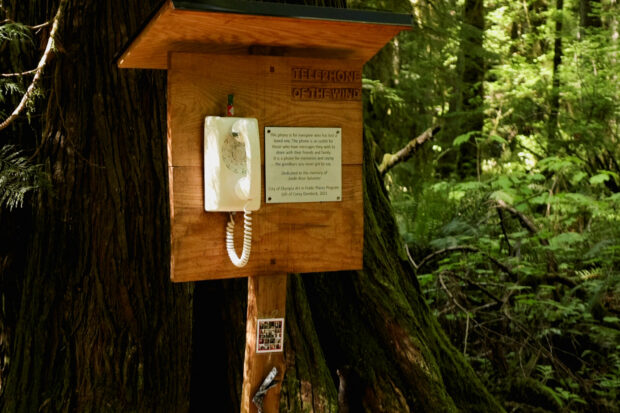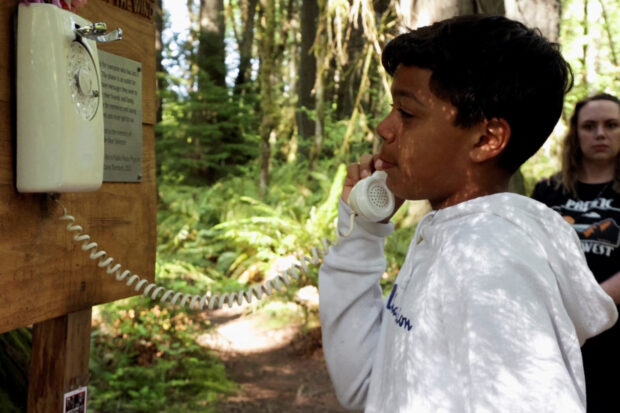‘I need an outlet’: Grieving relatives talk to lost loved ones on phone in the forest

A Telephone of the Wind installed by Corey Dembeck is seen at Squaxin Park, in Olympia, Washington, U.S., May 10, 2023. REUTERS FILE PHOTO
OLYMPIA, Washington — In the middle of a serene forest four miles from Washington state’s capital Olympia sits a vintage rotary phone.
It is not connected to a telephone line and looks out of place. But it has become a literal lifeline for people to speak words out loud to lost loved ones; words they never got the chance to say while they were still alive.
Corey Dembeck, 41, created and installed the original wind phone in the Pacific Northwest’s Squaxin Park in late 2020, after learning about the death of their family friend’s four-year-old daughter. It was inspired by the original wind phone set up in Otsuchi, Iwate Prefecture, Japan, ten years earlier.
“One morning, I woke up and went downstairs, and my wife looked shocked. She was like ‘Joelle died,'” says Dembeck. He has since moved away from Olympia but keeps in touch with the Sylvester family, whose young daughter Joelle Rose died suddenly after becoming sick with strep throat that triggered sepsis in her body. “It messed me up, so I was like, right then and there, I’m going to build one of these things for them.”
Dembeck, a U.S. Army veteran who worked as a photojournalist from 2000-2005, brought the phone, supplies and tools into the city-owned park and attached it to an old-growth cedar tree in a quiet area off a trail.
Dembeck, standing beside the phone almost three years later, says his reasoning behind sneaking it into the park was that it was better to ask for forgiveness than permission, especially because it was going to be something that was hard to explain.
After people learned of the phone and started visiting it in droves, the city decided to make it an official installation, removing it from the tree and working with Dembeck to create a signage board and plaque memorializing Joelle.
The plaque reads: “This phone is for everyone who has ever lost a loved one. The phone is an outlet for those who have messages they wish to share with their friends and family. It is a phone for memories and saying the goodbyes you never got to say.”
‘I need an outlet’
During a recent afternoon, Joelle’s family paid a visit to the phone to celebrate her life. Erin Sylvester, Joelle’s mother, said they sometimes have pizza parties and invite friends to join them.

Jayden Sylvester, 12, brother of Joelle Rose Sylvester, who died during 2020, calls his sister from the Telephone of the Wind that was installed in her honor, at Squaxin Park, in Olympia, Washington, U.S., May 10, 2023. REUTERS FILE PHOTO
“I need the phone. I need an outlet. Because it’s dedicated to my daughter, I feel like it’s different than for someone else to come and use it,” says Sylvester, 34, her eyes welling up with tears. “Not being able to hear her voice on the other side of that phone can be very gut-wrenching. So, I usually come when none of my other coping mechanisms are working and I’m looking for a last-ditch effort.”
Joelle’s brothers, Jayden, 12, and Jonah, 8, and her sister, Joy, 5, take turns speaking into the handset, telling her how much they love and miss her, and place new photos on the post and keepsakes that she loved on top of the phone.
During their visit, a speckled brown and white barred owl lands on a branch of the cedar tree, just above the phone. The family is mesmerized. Erin says owls were Joelle’s “baby theme” when she was born, and the same type of owl visited them recently in a similar way, but at a different location.
“It’s got to be a sign. There’s no other way I can think about it … that’s not a fluke,” says Joelle’s father, Andre Sylvester, 37, wiping tears from his eyes.
Moments later he picks up the phone to speak to his late daughter. “I miss you. Thanks for showing up today. I miss you a lot.” Sylvester says, looking up at the branch where the owl perched moments before. “I wish we could go take a walk around the block while I smoke my cigar and you tell everybody hi, and you pet every dog. I miss that.”
Since the installation of Olympia’s telephone, word of it has inspired other Americans to create ones across the country. Dembeck has spoken by email and phone with many others who have installed a phone in honor of their loved ones and he estimates there are now 50 across the United States.
Dembeck says everyone who tells him about using their phone also told him a tragic backstory.
“The fact that something simple like this immensely helped them, it’s been really humbling,” he says, adding he feels it’s the greatest thing he has ever done.
RELATED STORIES